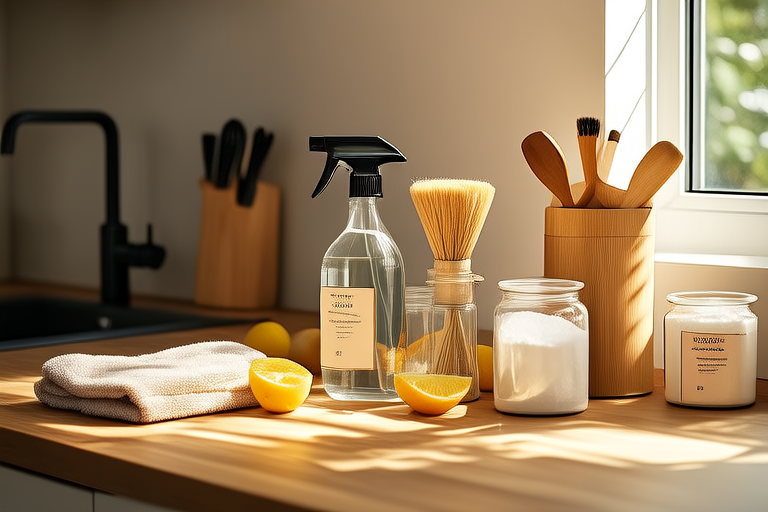Introduction
In today’s world, where environmental sustainability is becoming increasingly important, many people are seeking eco-friendly alternatives for their daily household cleaning. Traditional cleaning products often contain harsh chemicals that can be harmful to both the environment and human health. By switching to natural and sustainable cleaning solutions, you not only reduce your carbon footprint but also create a healthier living environment for yourself and your family. This guide will walk you through various natural cleaning methods, ingredients, and tips to help you achieve a clean home without compromising on sustainability.
Understanding the Benefits of Natural Cleaning Products
Why Choose Natural Over Chemical?
Traditional cleaning products are often laden with synthetic chemicals like ammonia, bleach, and phosphates. These chemicals can irritate the skin, eyes, and respiratory system, especially for those with allergies or sensitivities. Moreover, when these chemicals are washed down the drain, they can contaminate water sources and harm aquatic life. In contrast, natural cleaning products use plant-based ingredients such as vinegar, baking soda, and essential oils, which are biodegradable and less harmful to the environment.
Environmental Impact of Chemical Cleaners
The production and disposal of chemical cleaners contribute significantly to pollution. Manufacturing processes require energy and resources, while improper disposal can lead to soil and water contamination. By opting for natural alternatives, you help reduce waste and promote a more sustainable lifestyle. Additionally, many natural cleaning products come in recyclable packaging, further minimizing environmental impact.
Common Ingredients for Natural Cleaning
Vinegar: The Versatile Cleaner
Vinegar is one of the most versatile and effective natural cleaning agents. Its acidity helps break down grease and grime, making it perfect for kitchen surfaces, windows, and floors. To make a simple all-purpose cleaner, mix equal parts white vinegar and water in a spray bottle. For tougher stains, add a few drops of dish soap. You can also use vinegar to remove mineral deposits from taps and showerheads by soaking them overnight in a bowl of undiluted vinegar.
Baking Soda: Nature’s Abrasive Scrub
Baking soda, or sodium bicarbonate, is an excellent abrasive cleaner that can tackle tough dirt and odors. It works well as a gentle scrub for sinks, ovens, and tile grout. To clean oven racks, sprinkle baking soda over the racks and let it sit for an hour before wiping clean. For a refreshing deodorizer, leave an open box of baking soda in your refrigerator or freezer to absorb unpleasant smells.
Essential Oils: Adding a Fresh Scent
Essential oils like lemon, lavender, and tea tree offer not only pleasant aromas but also have antimicrobial properties. Adding a few drops of essential oil to your cleaning solutions can enhance their effectiveness while providing a delightful scent. For instance, adding five drops of lemon oil to your vinegar-based cleaner can give it a fresh citrusy fragrance and boost its disinfecting power.
Practical Tips for Implementing Natural Cleaning Routines
D.I.Y. Cleaning Recipes
Creating your own cleaning solutions at home is both cost-effective and environmentally friendly. Here are some easy recipes to get you started:
- All-Purpose Cleaner: Mix 1 cup of water, 1/2 cup of white vinegar, and 1 tablespoon of liquid castile soap in a spray bottle. Add 10 drops of your favorite essential oil for fragrance.
- Glass Cleaner: Combine 1 part white vinegar with 2 parts water in a spray bottle. Spray onto windows and wipe clean with a microfiber cloth for streak-free results.
- Disinfectant Spray: Use 1/4 cup rubbing alcohol, 1/4 cup water, and 2 tablespoons white vinegar in a spray bottle. Add 10 drops of tea tree oil for added antibacterial properties.
Green Cleaning Tools
Investing in reusable cleaning tools can further enhance the sustainability of your cleaning routine. Opt for microfiber cloths, sponges made from natural fibers, and refillable spray bottles instead of single-use paper towels and disposable plastic containers. These tools are durable, washable, and can be used repeatedly, reducing waste over time.
Case Studies and Success Stories
Transitioning from Chemicals to Naturals
Many households have successfully transitioned from chemical-based cleaners to natural alternatives. One family reported significant improvements in air quality and reduced instances of allergic reactions after switching to homemade cleaning solutions. Another homeowner noticed a decrease in water bills and less frequent plumbing issues since adopting greener cleaning practices. These real-life examples demonstrate the positive impacts of choosing natural cleaning products.
Community Initiatives and Support
Several communities have organized workshops and events to promote sustainable living, including natural cleaning techniques. Participants learn how to create their own cleaning products and share tips for maintaining a green household. Such initiatives foster a sense of community and encourage collective efforts towards environmental conservation.
Conclusion
Switching to natural and sustainable cleaning solutions is a simple yet impactful step towards creating a healthier and more eco-friendly home. By understanding the benefits of natural cleaners, utilizing common ingredients, and implementing practical tips, you can effectively maintain cleanliness while minimizing harm to the environment. Start small by incorporating one or two natural products into your routine and gradually expand your repertoire. Remember, every little change contributes to a bigger difference. Embrace the journey towards a greener lifestyle and enjoy the peace of mind that comes with it.
